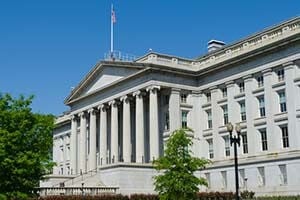 Those who have been asking "will the Fed raise interest rates in December?" received an update Wednesday from U.S. Federal Reserve Chairwoman Janet Yellen.
Those who have been asking "will the Fed raise interest rates in December?" received an update Wednesday from U.S. Federal Reserve Chairwoman Janet Yellen.
Speaking to the House Financial Services Committee, Yellen said the economy is "performing well," and that a December rate hike is a "live possibility."
The Fed Chief added that "it could be appropriate" to raise rates at the Fed's final policy meeting of 2015. The Fed's last meeting of the year takes place Dec. 15-16.
Still, Yellen made it clear that no decision has been made on the first interest hike in a nearly decade. But the central bank's tone has definitely grown more hawkish.
At the conclusion of the Fed's October meeting, U.S. policy makers laid out the possibly of a December rate increase. Fed officials pointed to "solid rates" of growth in consumer spending and business investment. They also removed a warning from their previous statement that said a global economic slowdown could sap U.S. economic strength.
After Yellen's Wednesday comments, federal fund futures, used by market participants to place wagers on central bank policies, put the possibility of an interest rate increase in December at 60%. That was up from 52% on Tuesday, and up from 38% before the Federal Reserve's statement on Oct. 28, according to data from CME Group.
But Yellen won't give a definitive answer to the question "will the Fed raise interest rates?" She continues to stress that the Fed's timing will hinge on the next string of economic data.
And these are the numbers that will be key to a December interest rate hike...
Will the Fed Raise Interest Rates? Keep an Eye on Jobs
Consensus estimates are for an increase of 183,000 jobs in Friday's nonfarm payrolls report for October. That would be a significant increase from the disappointing 142,000 jobs added in the month before.
[mmpazkzone name="in-story" network="9794" site="307044" id="137008" type="4"]
The unemployment rate is expected to dip to 5% from 5.1%. Most economists place a full employment read in the range of 5% to 5.5%.
Federal officials have been keeping a close eye on jobs data. But lately, central bank members appear less concerned with total growth and more concerned with a waning labor force participant rate (at a 36-year low), stagnant wage increases, and a barley budging average hourly work.
Without question, weak wage growth has been a key factor in holding the central bank back from raising its key interest rate from near zero. Rates have rested near that low level since late 2008.
Yellen has said throughout 2015 that a rate hike would likely be needed this year to keep the economy from eventually overheating. While the economy shows some signs of improving, it's not close to overheating.
And the fact that other global banks are engaging in easing measures is only confusing matters. Last week, the People's Bank of China cut interest rates for the sixth time in less than a year. The European Central Bank hinted at additional easing measures. And further stimulus moves from the Bank of Japan are expected.
Nonetheless, on CNBC late last month, Money Morning Chief Investment Strategist Keith Fitz-Gerald said a December rate hike is a good bet.
But not for the reason you may expect...
"I think the game here now is the Fed is looking at a labor market that's not as tight as they think, and they're looking declining earnings this season," Fitz-Gerald said. "I think they're wanting to lower rates in 2016, so they've got to get ahead of that and raise them now."
Stay informed on what's going on in the markets by following us on Twitter @moneymorning.
The Global Wealth Gap Is Now Alarmingly Wide: The top 0.7% of people in the world now control more than 45% of the entire world's wealth. But it's not just the lower class that's suffering. The global middle class is controlling less and less wealth every year...
Related Articles:
- MarketWatch: Dollar Poised for Further Gains as Traders Brace for December Hike
- CNBC: Private Companies Add 182K Jobs vs 180,000 Est: ADP
- The New York Times: December Interest Rate Increase Is 'a Live Possibility' Janet Yellen Says


